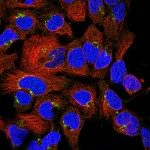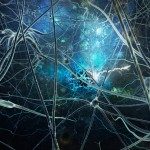Lien vers Pubmed [PMID] – 23781027
J. Cell. Sci. 2013 Aug;126(Pt 16):3678-85
Huntington’s disease (HD) is a dominantly inherited neurodegenerative disease caused by CAG expansion in the huntingtin gene, which adds a homopolymeric tract of polyglutamine (polyQ) to the encoded protein leading to the formation of toxic aggregates. Despite rapidly accumulating evidences supporting a role for intercellular transmission of protein aggregates, little is known about whether and how huntingtin (Htt) misfolding progresses through the brain. It has been recently reported that synthetic polyQ peptides and recombinant fragments of mutant Htt are readily internalized in cell cultures and able to seed polymerization of a reporter wild-type Htt. However, there is no direct evidence of aggregate transfer between cells and the mechanism has not been explored. By expressing recombinant fragments of mutant Htt in neuronal cells and in primary neurons, we found that aggregated fragments formed within one cell spontaneously transfer to neighbors in cell culture. We demonstrate that the intercellular spreading of the aggregates requires cell-cell contact and does not occur upon aggregate secretion. Interestingly, we found that the expression of mutant, but not wild-type Htt fragments, increases the number of tunneling nanotubes, which in turn provide an efficient mechanism of transfer.



